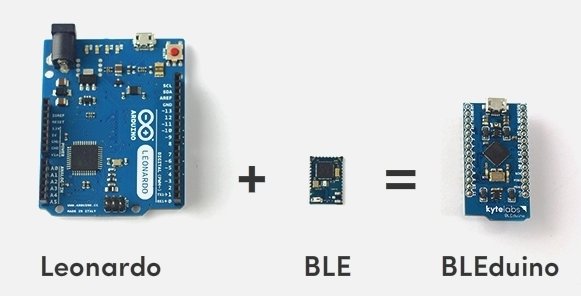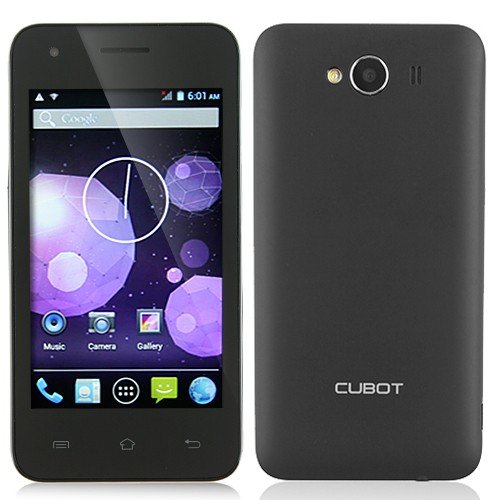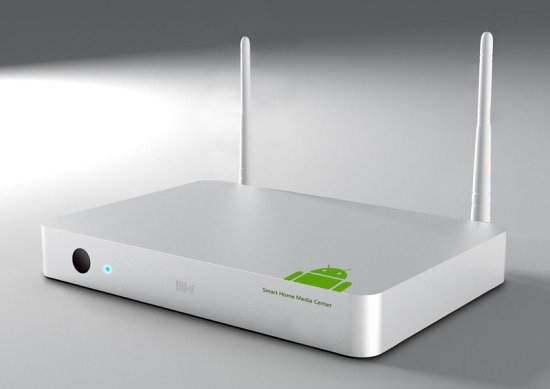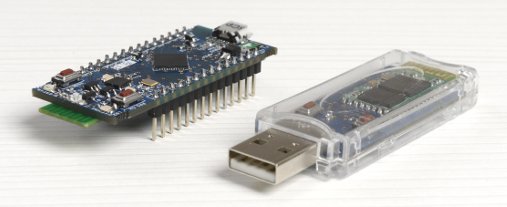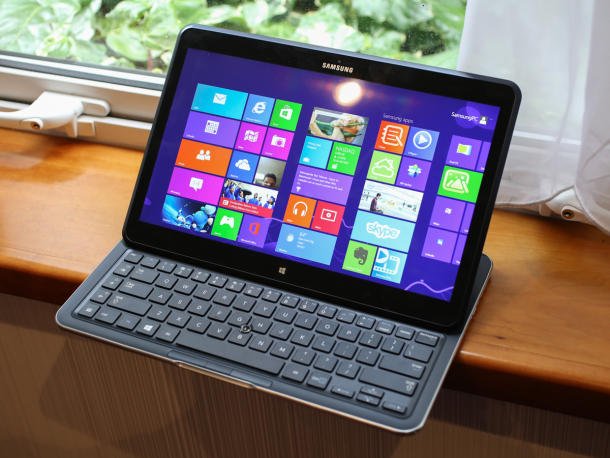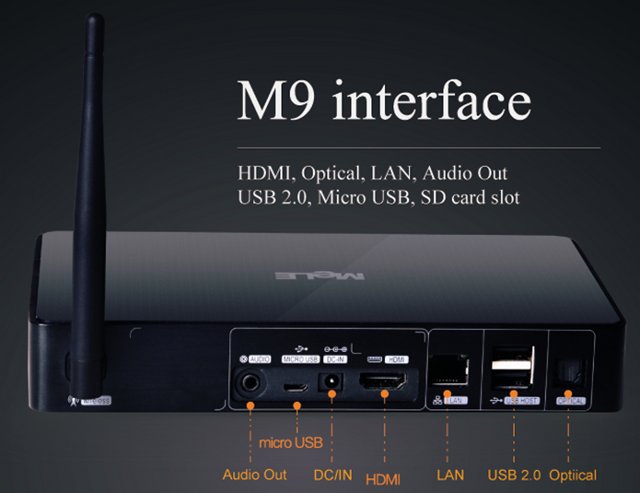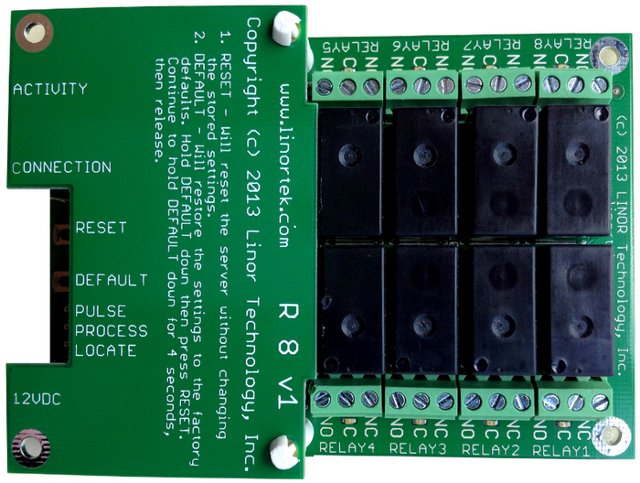After RFDuino, here’s another tiny low cost Bluetooth 4.0 SMART development board compatible with Arduino. BLEduino board is the merger of Arduino Leonardo and Bluetooth module, features Atmel ATmega32u4 MCU, Nordic Semi nRF8001 for BLE, and includes an on-board USB programming interface. Key features of BLEduino board: MCU – Atmel ATmega32u4 @ 16 MHz with 32 KB flash, 2.5 KB SRAM, and 1 KB EEPROM Power Supply – 5V. Onboard 5V & 3.3V regulators I/O: 21x GPIO Pins 6x PWM Channels 12x Analog Input Channels Serial Communication – UART, SPI, I2C LED – RX/TX for serial communication, LED for Bluetooth connectivity Bluetooth – Version 4.0 with Low Energy sypport via Nordic Semi nRF8001. Expected range: at least 24 meters Dimensions – Around 22.8 x 43.2 mm Kytelab, the company behind BLEduino, also provides “Shield-Shield”, a baseboard that translates BLEduino’s pin layout into the traditional Arduino layout, and allows you to […]
GEAK Watch is an Android 4.1 Smartwatch Packed with Features
Smartwatches have been available since 2011, in different formats, most of the time as a smartphone companion such as Pebble, or sometimes with slightly more powerful hardware running Android 2.3. one example being the I’m Watch. The GEAK Watch goes a step further for a relatively powerful Ingenic JZ4774 MIPS processor clocked at 1 GHz, Android Jelly Bean, WiFi 802.11b/g/n, Bluetooth 4.0, NFC…, and the ability to install apps directly from an app store. GEAK Watch hardware specifications: SoC- Ingenic JZ4774 processor @ 1GHz System Memory – 512MB RAM Storage – 4GB NAND Flash Display – 1.55″ LED capacitive touch screen (OGS) with 240 × 240 resolution Connectivity: WiFi 802.11 b/g/ n Bluetooth 4.0 NFC/GPS/FM Sensors – G-Sensor, Gyroscope, and Geomagnetic sensors Battery – 330mAh lithium polymer battery The watch is water-resistant (IP3X), enables heartbeat and blood pressure monitoring (maybe with external Bluetooth hardware), can be used as a pedometer, and […]
$70 Cubot GT72 Android “4.2” Smartphone Powered by Mediatek MT6572
Mediatek MT6572 is a new dual core Cortex A7 processor with a Mali-400 GPU, as well as a HSPA+/TD-SCDMA modem. This SoC announced last month, is now starting to show up in low cost smartphones such as Cubot GT72. The phone is said to run Android 4.2.2, comes with a 4″ display, and 256MB RAM, and 512MB flash. Here are the specifications of this phone: SoC – Mediatek MTK6572 dual core cortex A7 @ 1.2GHz + Mali-400 GPU System Memory – 256MB RAM Storage – 512MB Flash + micro SD card slot (up to 16 GB) Display – 4.0″ TFT capacitive (2 points) touch screen (800×480) with 260K colors Connectivity – Wi-Fi 802.11 b/g, Bluetooth 2.0, built-in GPS Network – GSM 900/1800MHz, dual SIM card slot. Camera – 3MP rear camera with flash light, and 2MP front camera Audio – 3.5mm earphone jack Misc – Gravity sensor, FM Radio Battery – […]
Kaiboer F4 Rockchip RK3188 Powered Set-top Box with Two External Wi-Fi Antennas
We’ve got a another full-sized Android set-top box featuring Rockchip RK3188 quad core processor, this time with not one, but two external Wi-Fi antennas, as well as the usual 2GB RAM, and Android 4.2 operating system. Here are the specifications of the device: SoC – Rockchip RK3188 up to 1. 8 GHz with Mali-400 MP4 GPU System Memory – 2GB DDR3 Storage – 8 to 16GB Flash + 1x SD card Video Output – HDMI, and AV Audio Output – HDMI, AV, and optical S/PDIF Connectivity – 10/100M Ethernet, and Wi-Fi 802.11 b/g/n with 2 external Wi-Fi antennae USB – Micro USB OTG + 4x (or is it 2x?) USB host ports Power & reset buttons The device should be available within 20 days in China, but the product looks very similar to another Kaiboer STB based on RK3066 and selling for 519 RMB ($84), so it’s unlikely it will […]
$25 Babuino Stick & Board Let You Control Your Devices with Your Smartphone and Vice Versa
Babuino Stick and Babuino Board are tiny low cost Arduino-compatible USB dongle and board featuring Atmel AVR MCU, and Bluetooth 2.0 + EDR connectivity. Both have basically the same hardware, but Babuino Stick is more suited to control a computer or Smart TV via your smartphone, and Babuino Board can be used for robotics and automation projects. The device can also be used to control your smartphone (e.g. to write SMS) from your PC or Mac. Here are the specifications of these “Babuini”: MCU – Atmel ATXMega128A1 @ 32 MHz with 128KB flash program memory, 8KB boot code section, and 8KB SRAM. Master/Slave selectable Bluetooth 2.0 + EDR module Infrared transmitter and receiver USB – micro USB (board) and USB port (stick) User and reset push-buttons Headers (Board only) – ICSP pins, ADC & DAC, PWM, I2C & SMBus, SPI and UART LEDs – Bluetooth and User LED for both, […]
Samsung Unveils ATIV Q Android & Win8 Convertible Tablet, Galaxy NX DSLR Camera Running Android 4.2
Samsung Premiere 2013 took place yesterday in London, and the company announced 9 new products at the event. But 2 devices really stood out for me: ATIV Q – A 13.3″ tablet convertible to a notebook that runs Windows 8 and Android 4.2.2 simultaneously. Galaxy NX – a DSLR Camera running Android 4.2.2 supporting interchangeable lenses. Galaxy S4 Active was also interesting as it’s compliant with IP67, which means it’s dust proof and water resistant, so you don’t have to worry about dust / sand getting into the device, or dropping it into the water. It can stay under in 1 meter of water for 30 minutes, and even though the touchscreen won’t operate under water, you can still take underwater pictures during your snorkeling trip. Don’t expect it to work for diving though. Samsung ATIV Q (Preliminary) Specifications: Processor – Intel Core i5 (Haswell) GPU – Intel HD Graphics […]
Mele M9 Android Set-top Box Powered by AllWinner A31
After Mele A1000G Quad, Mele has just launched another model called M9, still based on AllWinner A31 quad core processor, with an external Wi-Fi antenna, but no SATA support. Mele M9 specifications: SoC – AllWinner A31 quad core Cortex A7 @ 1.5GHz + PowerVR SGX544MP2 GPU System Memory – 2GB DDR3 RAM Storage 16GB NAND Flash SD card slot Video Output – HDMI 1.4 Audio I/O – HDMI + S/PDIF optical out + Audio jack output Video Playback – Up to 2160p @ 60 Mbps USB – 3x USB 2.0 host ports, 1x mini USB 2.0 OTG port Connectivity Ethernet – 10/100Mbps Wi-Fi – 802.11 b/g/n Power Supply – 5V/2A The device runs Android 4.1 with a customized “Windows 8” user interface, and comes with a 5V/2A power adapter, an IR remote control (show below), an HDMI cable, a user’s manual, and a warranty card. The remote above as a […]
Linor Technology Fargo are Ethernet Boards with 4 to 8 Relays
There are more and more “IoT” solutions for home or industrial automation which allow you to control your lights or other equipments remotely with your smartphone or tablet. Many of them are DIY with boards such Arduino or Raspberry Pi combined with an expansion board featuring one or more relays, and some of them can be used out of the box such as Linor Technology Fargo boards. The company designed 4 boards that are powered by a Microchip PIC32 MCU with a small NOR flash, provide Ethernet connectivity, and run a small webserver that allows you to monitor and control the relays with any connected device that can run a web browser. Here are the hardware specifications for the boards (Fargo R8, R4, R4ADI and R4DI): MCU – Microchip PIC32 32-bit MCU Storage – 8MB flash on Fargo R8 for firmware and log storage (up to 10,000 items log) Sensors: […]


